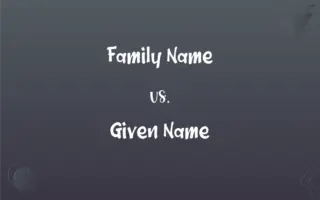Courtesy vs. Politeness: What's the Difference?
Edited by Harlon Moss || By Janet White || Published on December 13, 2023
Courtesy is considerate behavior toward others, reflecting respect and good manners, while politeness is the expression of good manners or etiquette in behavior or speech.

Key Differences
Courtesy often involves actions that go beyond basic politeness, showing a deeper level of respect and consideration for others. Politeness, in comparison, is more about adhering to social norms and manners in interactions.
Acts of courtesy can include gestures of kindness and helpfulness, reflecting an awareness of others' needs or feelings. Politeness is characterized by using respectful language, maintaining appropriate demeanor, and following social etiquette.
Courtesy is sometimes associated with chivalry and can be seen in actions like holding the door for someone. Politeness, on the other hand, might involve simply saying "please" and "thank you" in conversations.
In certain cultures, courtesy may involve specific traditional or formal gestures, indicating deep respect. Conversely, politeness can be more universal, involving general good manners and respectful communication.
Courtesy often requires a more conscious effort and a genuine intent to show respect. Politeness can sometimes be more automatic or surface-level, following common social conventions.
ADVERTISEMENT
Comparison Chart
Nature
Actions showing deep respect and consideration
Adherence to social norms and good manners
Expression
Gestures of kindness, helpfulness, and respect
Respectful language, appropriate demeanor
Examples
Holding doors, offering help
Saying "please" and "thank you", proper greetings
Cultural Aspect
May involve traditional or formal gestures
Generally universal, following common conventions
Intention
Often requires conscious effort and genuine intent
Can be more automatic, following social rules
ADVERTISEMENT
Courtesy and Politeness Definitions
Courtesy
Considerate behavior that shows respect and thoughtfulness.
His courtesy was evident when he helped her carry her bags.
Politeness
Observance of good manners and social etiquette.
Her politeness was appreciated during the dinner conversation.
Courtesy
A respectful gesture or deed towards others.
Sending a thank-you note was a courtesy after the interview.
Politeness
Exhibiting courteous and respectful behavior.
Politeness is important in professional settings.
Courtesy
Demonstrating chivalry or gallant behavior.
He displayed courtesy by patiently waiting for her to speak first.
Politeness
Adhering to societal norms of respectful behavior.
Politeness dictated that he write a thank-you letter.
Courtesy
Polite actions, often beyond basic manners.
Offering his seat to the elderly woman was an act of courtesy.
Politeness
The practice of being mindful of others in communication.
Using polite language is a basic aspect of politeness.
Courtesy
Kind and polite behavior often reflecting generosity.
Their courtesy to guests made everyone feel welcome.
Politeness
The act of being respectful and considerate in speech or behavior.
He showed politeness by not interrupting the speaker.
Courtesy
Polite behavior.
Politeness
Marked by or showing consideration for others and observance of accepted social usage.
Courtesy
A polite gesture or remark.
Politeness
Refined; elegant
Polite society.
Politeness
The quality of being polite.
Politeness
An act of politeness.
Politeness
High finish; smoothness; burnished elegance.
Politeness
The quality or state of being polite; refinement of manners; urbanity; courteous behavior; complaisance; obliging attentions.
Politeness
A courteous manner that respects accepted social usage
Politeness
The act of showing regard for others
FAQs
Is courtesy inherent or learned?
Courtesy is generally learned and cultivated.
Can politeness be faked?
Yes, politeness can sometimes be insincere or superficial.
Can courtesy improve relationships?
Yes, courteous behavior often strengthens relationships.
Does courtesy vary across cultures?
Yes, what's considered courteous can differ widely between cultures.
Is politeness necessary in all social interactions?
Generally, yes, as it facilitates respectful and smooth interactions.
Can politeness be misinterpreted?
Sometimes, especially in intercultural contexts.
Can courtesy lead to better customer service?
Yes, courtesy is key in providing excellent customer service.
Can politeness be taught to children?
Yes, teaching children politeness is part of their social development.
Is politeness always verbal?
No, it can also be non-verbal, like nodding or smiling.
Is courtesy valued in all societies?
While its forms vary, courtesy is generally valued worldwide.
Is courtesy the same as kindness?
Courtesy includes kindness, but it also involves respect and consideration.
Is politeness critical in digital communication?
Yes, it's important for clear and respectful online interactions.
Does politeness always mean agreeing with others?
No, one can be polite while expressing differing opinions.
Does courtesy affect one’s professional image?
Yes, being courteous can enhance a professional reputation.
Is courtesy beneficial in multicultural environments?
Absolutely, it helps bridge cultural differences.
Does courtesy require extra effort?
Often, as it involves going beyond basic manners.
Does politeness help in conflict resolution?
Yes, polite communication can aid in resolving conflicts.
Can courtesy be a form of self-expression?
Yes, it can reflect personal values and character.
Can politeness improve one's social standing?
Polite behavior is often positively perceived in social settings.
Is politeness just following rules?
It involves following social rules but also showing respect.
About Author
Written by
Janet WhiteJanet White has been an esteemed writer and blogger for Difference Wiki. Holding a Master's degree in Science and Medical Journalism from the prestigious Boston University, she has consistently demonstrated her expertise and passion for her field. When she's not immersed in her work, Janet relishes her time exercising, delving into a good book, and cherishing moments with friends and family.
Edited by
Harlon MossHarlon is a seasoned quality moderator and accomplished content writer for Difference Wiki. An alumnus of the prestigious University of California, he earned his degree in Computer Science. Leveraging his academic background, Harlon brings a meticulous and informed perspective to his work, ensuring content accuracy and excellence.






































































